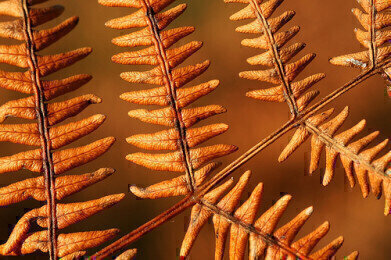News & Views
Could a British Fern Be the Next Big Biofuel Source?
Jan 17 2016
The UK is famous for its lush green countryside, and now scientists are suggesting that a native fern could be Britain’s next source of biofuel. The concept has been developed by south west based company, Brackenburn. As the name suggests, the company used bracken to produce biomass pellets which they refer to as “brackettes.” Thanks to its innovation, what was once considered a ‘pest’ could soon be a hugely valuable resource.
Turning bracken into biofuel
The process involves shredding bracken, compressing it into briquettes and dividing these up into pellets. When burnt they produce far more heat than oak which makes them a more efficient, and eco-friendly resource.
There’s certainly no shortage of bracken in the UK, with Brackenburn's marketing and sales director Barry Smith estimating that the nation is home to at least 2.5 million acres of the fern. Harvesting the foliage has no negative impact on the environment, with Smith explaining that "Left unchecked, bracken encroaches by three percent a year… at the end of the day there's no use for it whatsoever. It's a nuisance and to call it a crop is kind of giving it a status it doesn't deserve."
So what makes bracken such a desirable source of biofuel? According to Brackenburn, its product burns hotter and longer than oak and other woods, giving it impressive eco credentials. This is due to the low moisture content and high calorific value of the plant.
"Once it's cut, once it's dried, once it's briquetted, the calorific value is greater than the equivalent briquette would be of oak," says Smith.
From weed to work
As well as being an eco-friendly source of fuel, bracken also supports the local economy. Briquettes are currently harvested, manufactured and sold locally for around £6.99 per 7 to 10 kilos. Smith maintains that the process creates jobs in rural areas, and boosts the UK’s biofuel status.
As for the claims that bracken contains carcinogenic associated with stomach and oesophageal cancer. Brackenburn is adamant that carcinogens die when bracken wilts, which is why the fern is only harvested when it’s brown.
The biofuel industry is remarkably innovative, but it’s not without its hurdles. ‘Biofuels and their Precursors – A Challenge for Common Elemental Analyzers’ looks at the logistical barriers of mass biofuel production, and how innovative flame sensor technology is helping scientists overcome them.
Image via Flickr Creative Commons. Photo credits: nutmeg66
Digital Edition
Lab Asia 31.2 April 2024
April 2024
In This Edition Chromatography Articles - Approaches to troubleshooting an SPE method for the analysis of oligonucleotides (pt i) - High-precision liquid flow processes demand full fluidic c...
View all digital editions
Events
May 05 2024 Seville, Spain
InformEx Zone at CPhl North America
May 07 2024 Pennsylvania, PA, USA
May 14 2024 Oklahoma City, OK, USA
May 15 2024 Birmingham, UK
May 21 2024 Lagos, Nigeria




.jpg)













